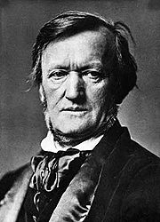
Richard Wagner
Wilhelm Richard Wagner was an influential German composer, conductor, music theorist, and essayist, primarily known for his groundbreaking "music dramas".
Sourced
- The error in the art-genre of Opera consists herein: a Means of expression (Music) has been made the end, while the End of expression (the Drama) has been made a means.
- Opera and Drama (1852)
- Music has taken a bad turn; these young people have no idea how to write a melody, they just give us shavings, which they dress up to look like a lion's mane and shake at us... It's as if they avoid melodies, for fear of having perhaps stolen them from someone else.
- Cosima Wagner's Diaries: An Abridgment (Geoffrey Skelton), June 21, 1880
- It should not be presumed that these people (the Jews), who are so separated from us by their religion, have any right to make our laws. But why blame the Jews? It is we who lack all feeling for our own identity, all sense of honour.
- Cosima Wagner's Diaries: An Abridgment (Geoffrey Skelton), November 14, 1878
- I am writing Parsifal only for my wife -- if I had to depend on the German spirit, I should have nothing more to say.
- Cosima Wagner's Diaries: An Abridgment (Geoffrey Skelton), December 2, 1877
- Oh, I hate the thought of all those costumes and grease paint! When I think that characters like Kundry will now have to be dressed up, those dreadful artists' balls immediately spring into my mind. Having created the invisible orchestra, I now feel like inventing the invisible theatre!
- Cosima Wagner's Diaries: An Abridgment (Geoffrey Skelton), September 23, 1878
- Certain things in Mozart will and can never be excelled.
- Cosima Wagner's Diaries: An Abridgment (Geoffrey Skelton), February 26, 1878
- This is Alberich's dream come true -- Nibelheim, world dominion, activity, work, everywhere the oppressive feeling of steam and fog.
- Cosima Wagner's Diaries: An Abridgment (Geoffrey Skelton), May 25, 1877, Richard's description of London
- It is necessary for us to explain the involuntary repugnance we possess for the nature and personality of the Jews....
- The Jews have never produced a true poet. Heinrich Heine reached the point where he duped himself into a poet, and was rewarded by his versified lies being set to music by our own composers. He was the conscience of Judaism, just as Judaism is the evil conscience of our modern civilization.
- "Judaism in Music" (1850)
- I believe in God, Mozart, and Beethoven.
- "The Life's End of a German Musician in Paris", a short story written for the Gazette Musicale
- I hate this fast growing tendency to chain men to machines in big factories and deprive them of all joy in their efforts - the plan will lead to cheap men and cheap products.
- "Art and Revolution (1849)
Unsourced
- From wisdom, understanding. From understanding, compassion. From compassion, love.
- I believe that through art all men are saved.
- I know absolutely nothing about music.
- I write music with an exclamation mark!
- Joy is not in things; it is in us.
About Wagner
- Wagner's music is better than it sounds - Mark Twain
- Wagner has great moments but dull quarter hours - Rossini
- Every time I listen to Wagner, I get the urge to invade Poland - Woody Allen
- I like Wagner’s music better than any other music. It is so loud that one can talk the whole time, without people hearing what one says. - Oscar Wilde, The Picture of Dorian Gray
